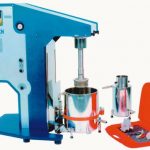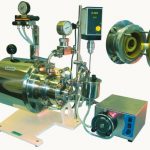Laboratory machines, designed for mixing, dispersing, kneading, wet grinding and de-aeration, are an established feature of wet grinding technology. Their applications range from developing new products and processing small batches of high-tech materials to quality control and assurance as well as process optimisation.
Georg Scherer
The extensive laboratory mill family from Netzsch-Feinmahltechnik offers an efficient solution for all dispersing and wet grinding tasks. Owing to the compact design and the resulting geometrical dimensions of the laboratory machines, they can be constructed using different materials. The application spectrum – whether solvent or water based – is unlimited thanks to this material diversity.
Batch wet grinding systems
If simple dispersing tasks have to be handled or if the grinding behaviour of a product needs to be tested, the easy-to-operate PE 075 laboratory batch mill is the ideal grinding system. The coolable grinding tank has a capacity of 0.75 l and can be filled in a product batch of 0.15 to 0.3 l with approximately 0.25 l of grinding media. Various easy-to-exchange agitating tools can be supplied, such as the proven eccentric disc agitator, the moliNEx system and an attrition system. The grinding media is kinetically activated by the rotating agitators and grinds the caught particles by shearing and impact forces. Both the agitator tools and the grinding tank can be designed in different materials, including zirconium oxide, aluminium oxide, Cr-In steel and tungsten carbide. The speed is infinitely variable via a speed gear.
The LabTopMill laboratory basket mill achieves a product fineness in the region of <5 µm. The biggest advantage of this machine is its easy cleaning and handling. Typical batch sizes of 1 to 12 l can be processed without a pump or pipelines. The products can be processed roughly without product loss and the product can be changed in just a few minutes. This laboratory basket mill has an unique grinding system with a rotating grinding basket filled with grinding media that dips into a product-filled tank. The movement of the product is caused by the radial acceleration of the rotating basket. The product is sucked into the grinding zone via the upper and lower slotted face surfaces and carried out radially via the circumferential slotted pipe.
The rotation of the grinding basket causes the movement of the grinding media. A stator in the basket decelerates the media and produces the differential speed neces-sary for grinding. Ideal circulation conditions are created by the intensive product rotation and the product is finely ground by the repeated flow through the basket. The grinding basket can be replaced by a toothed disc to pre-disperse the product. The main fields of application of the LabTopMill laboratory basket mill extend from paints and printing inks to cosmetics and biotechnology.
Continuous wet grinding systems
Specially developed for basic R&D tests, the MiniZeta is a versatile laboratory circulation mill that is easy to handle and achieves excellent reproducible results as well as particle sizes down to a few nano. The swivelling grinding tank of the MiniZeta allows not only simple filling and emptying of the grinding media but also easy cleaning. This machine, which is designed with an integrated circulation tank, allows small product batches of approximately 0.25 to 0.5 l to be processed with grinding media only 0.5 mm in diameter. The grinding medium is kept in the mill by a separation gap of 0.2 to 0.3 mm. This gap is formed by a static gap ring at the housing end and a dynamic gap ring at the agitator shaft end. A lip seal guarantees sealing of the agitator shaft between the product and atmosphere sides. The design of the MiniZeta allows circulation without a product pump because the mill rotor works in the same way. The agitator shaft is electrically or pneumatically driven when used in potentially hazardous areas. The speed is infinitely adjustable.
For small product batches
If exactly reproducible grinding results and finenesses down to a few nano are demanded for small product batches, and if grinding has to take place in metal-free conditions, the newly developed MiniCer and MiniPur laboratory agitator bead mills offer the perfect solution. The MiniCer, with a grinding chamber made of zirconium oxide, is designed for processing solvent based products. The polyurethane MiniPur, on the other hand, is used to process water based products. Both machines are intended for grinding small batches in the range from 0.25 to 0.5 l. The products are continuously processed in circulating operation between the integrated circulation tank – which in the case of the MiniPur has a coolable design – and the lab- oratory mill. The two laboratory machines are equipped with a double-acting mechanical seal and an adjustable hose pump. With its swivelling grinding chamber, this machine is simple to fill and empty as well as very easy to clean. The MiniCer and MiniPur feature a peg agitator, but in contrast to the MiniZeta both machines work with the highly efficient rotor slotted pipe centrifugal system. This permits the use of small grinding media from 0.3 to 2 mm in diameter. The coolable ceramic grinding tank also allows batch operation, whereby the product inlet and outlet can be closed with a blind plug.
Among the potential applications of the MiniCer and MiniPur are metal-free grinding of life science products, ceramics, and organic and inorganic pigments.
Exact scale-up
The LabStar is a universally suitable lab- oratory mill that facilitates precise grinding, especially for difficult research and development tasks in industry and science. Regardless of whether this laboratory mill is used for the development of new products, quality assurance or process optimisation, it is easy to handle and offers a high degree of flexibility regarding the available grinding chamber materials for both grinding systems. The LabStar, which is designed with IP or Ex protection, has a 3 kW electric drive that is infinitely adjustable by means of a frequency inverter. Depending on the grinding system, the grinding chamber has a capacity of 0.6 to 0.75 l. Product batches of 1.5 to 5 l can be processed. The laboratory mill can be operated with the proven TriNEx grinding system – the disc grinding system with a pre-classifying disc – or Zeta – the peg grinding system with a rotor slotted pipe centrifugal separation system. Depending on the application, it can be designed in steel, ceramic materials such as aluminium oxide, zirconium oxide, silicon nitride, silicon carbide or polyurethane. Due to this versatility, the LabStar can process virtually any material according to the application and operation of the machine, for example circulation, passage or multi-passage. Product finenesses of less than 100 nm (x50) can be achieved using 0.1 mm grinding media. These grinding results are exactly reproducible on production machines. The LabStar’s further advantages include easy evaluation and documentation of the test results with the specially developed LabDat software and a swivelling grinding tank for convenient product changing and easy cleaning.
Dispersing or wet grinding of pharmaceutical products places high demands on the material, surface condition and process control. The pharma LabStar meets these challenging requirements in full. The machine takes the form of a complete, sterile, clearance-free module in CMP design and made of stainless steel AISI 304. All product-wetted parts are AISI 316 L with Ra 0.5 µm. In addition, two different grinding systems are available for the pharma LabStar. All process-related data is collected during the grinding process and presented on the integrated colour display. The complex control of the different process steps, for instance a sterilisation procedure or a grinding process, guarantees maximum reproducibility and operating reliability.
cpp 473
Share:








